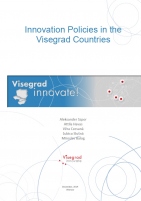Innovation Policies in the Visegrad Countries

| Author: | Aleksander Szpor, Attila Havas, Věra Czesaná, Ľubica Slušná and Miroslav Balog |
|---|---|
| Place of issue: | Warsaw |
| Year of issue: | 2014 |
| ISBN: | 978-83-63857-24-0 |
Projects
VISEGRAD INNOVATE!
Completed projectProject duration: 2014
This project was aim to create an independent framework for innovative research in the V4 countries and also served as a critical analysis of their innovation policies. The research was based on an interdisciplinary approach in order to get perspective on measurement of innovations and on instruments of public policy of V4 countries. The narrower and broader cooperation between experts from different backgrounds was helped to reconsider innovation policy in the V4 countries. Poland, Slovakia, Hungary and the Czech Republic were part of this project.

 Česky
Česky English
English